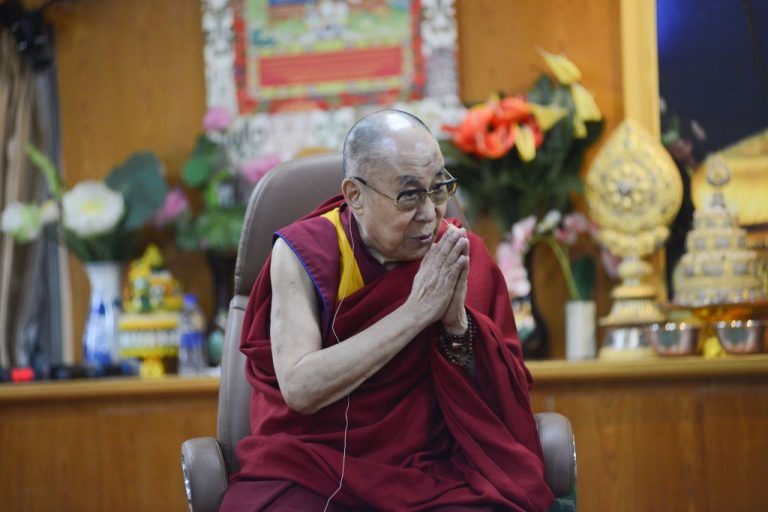U.S. Secretary of State Antony Blinken recently met with the representative of the Dalai Lama during his trip to India. The representative, Ngodup Dongchung, acts on behalf of the Central Tibetan Administration (CTA), also known as the Tibetan government in exile. It is based in Dharamsala, India.
This is the first conspicuous meeting between American and Tibetan officials since former President Barack Obama met with the Tibetan spiritual leader in Washington in 2016. During Blinken’s meeting, Dongchung presented him with a scarf from the Dalai Lama.
A U.S. official stated that the gesture was “gratefully received and appreciated.” Blinken also met with Geshe Dorji Damdul, senior member and Director of the Tibet House. Tibet House is a cultural center founded by the Dalai Lama in 1965.
Blinken’s visit is congruent with Washington’s increasingly pro-Tibet stance in recent years. In November 2020, Lobsang Sangay, the former head of the Tibetan government in exile, visited the White House. This was the first visit to the White House by a representative of the CTA in six decades. A month later in December, President Donald Trump signed into law the Tibet Policy and Support Act. It passed through the U.S. House of Representatives with a vote of 392-22.
The policy stated that the United States would only recognize the succession of Tibetan Buddhist leaders, including that of the Dalai Lama. The appointment must be made by Tibetan Buddhists without any interference from the Chinese communist regime. CCP officials who interfere in such selection procedures would face sanctions according to the Global Magnitsky Act. In addition, the law also calls for Washington to set up a new American Embassy in Tibet’s capital, Lhasa.
Tibetan persecution
Success
You are now signed up for our newsletter
Success
Check your email to complete sign up
Penpa Tsering, president of the Tibetan (in-exile) government conducted an interview with the Associated Press in June. He said that the Dalai Lama has expressed a desire to visit his birthplace in Tibet.
Communist China invaded Tibet in 1950, annexing the region. Chinese forces clashed with Tibetan forces in 1959 in a failed Tibetan uprising. The 14th Dalai Lama, Tensin Gyatso, escaped and settled down in Dharamsala where he has been living ever since. In the interview, Tsering strongly criticized the Chinese communist regime for trying to eradicate the Tibetan language and culture that form the basis of Tibetan Buddhism.
“The language is very important but today it has become something only taught in a language class. All other subjects at school are taught in Chinese, and the Chinese leaders are not even following a two-language system in which you give equal weight to both languages. That, as well as the government policy of not publishing official documents in Tibetan, is striking at the very root of Tibetan existence. If our language goes, the religion will also go away slowly,” Tsering stated.
On July 7, the Dalai Lama’s 86th birthday, Blinken tweeted his greetings, saying that the spiritual leader’s “messages of peace, equality, and compassion” are an inspiration for all. Chinese nationals hosted a red banner and five-starred red flags on the opposite side of the Indian border when Indian villages were celebrating the birthday.
In an interview with The Epoch Times, Urgain Tsewang, head of the village of Koyul, in the Nyoma sector of Ladakh, said that such intimidation tactics by the CCP have taken place several times.
“Last year, we couldn’t celebrate due to COVID restrictions. This year, we got permission for a gathering of only 30 people. With the presence of Indian army personnel and tourists and so on, we had a total of 50 people,” Tsewang told The Epoch Times.
India and United States
Blinken met with several Indian officials during the visit, including his counterpart Foreign Minister Subrahmanyam Jaishankar. Both sides discussed a range of issues like human rights, COVID-19 vaccines, and the Quad alliance, a security group comprising the two countries as well as Japan and Australia.
China has expressed annoyance at the Quad alliance. Blinken was asked about communist China’s stance at a news conference. He dismissed it and said that it is not strange for countries to work together and that “people need to get over the idea that somehow other countries doing things is directed against them.”
During a meeting with a group of Indian civil society leaders, Blinken called the alliance between Washington and New Delhi “one of the most important in the world.” The minister pointed out that people of both nations believe in “human dignity and equality of opportunity.” He said the U.S. and India also want to uphold ideas like freedom of faith and rule of law, which he called the “fundamental tenets of democracies like ours.”
“I was pleased to meet civil society leaders today. The U.S. and India share a commitment to democratic values; this is part of the bedrock of our relationship and reflective of India’s pluralistic society and history of harmony. Civil society helps advance these values,” Blinken tweeted.














